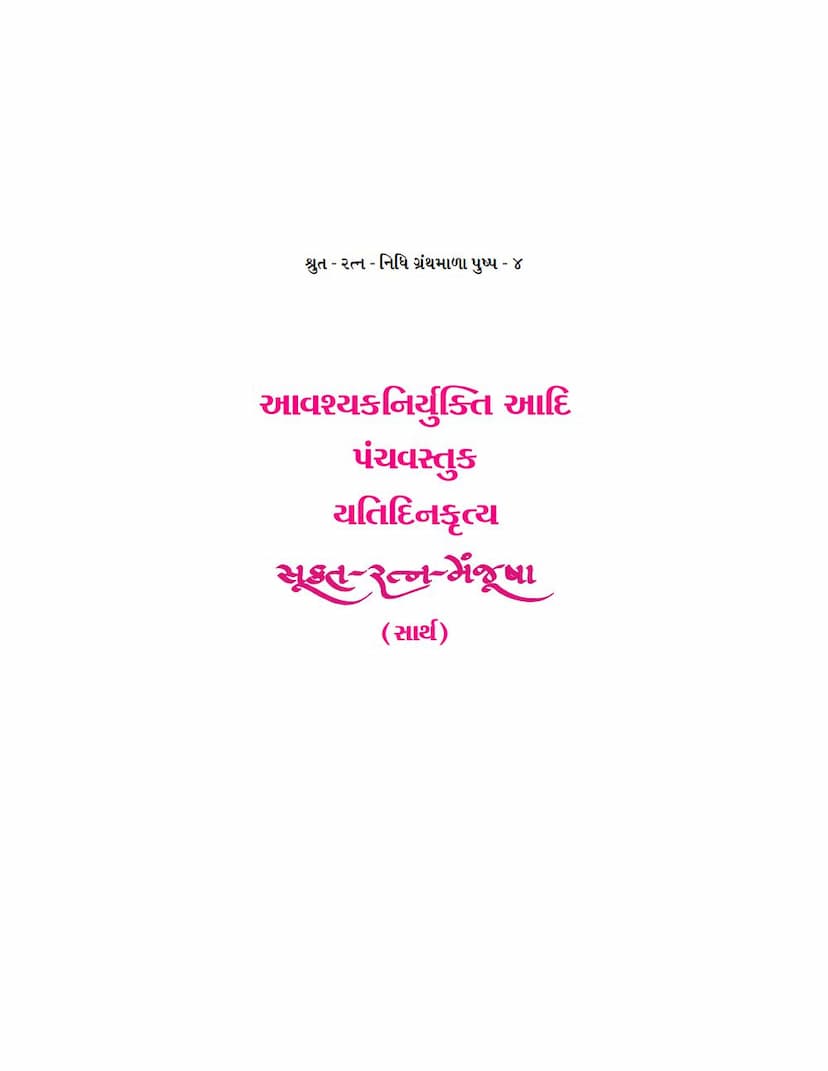Sukta Ratna Manjusha Part 04 Aavashyak Niryukti Aadi Panchvastuk Yatidinkrutya
Added to library: September 2, 2025

Summary
This document is a Jain text titled "Sukta Ratna Manjusha Part 04 Aavashyak Niryukti Aadi Panchvastuk Yatidinkrutya," authored by Bhavyasundarvijay and published by Shramanopasak Parivar. It is part of the "Shruta-Ratna-Nidhi Granthamala" series.
The book is dedicated to Acharya Shri Vijay Ratnasundersurishwarji Maharaj on the occasion of his Golden Jubilee of monastic life.
Content Overview:
The book is a compilation of selected verses (Gathas) from various significant Jain scriptures, aiming to make them accessible for memorization and practice. The core purpose is to revive the tradition of memorizing Jain scriptures, which has been declining due to the vastness of the original texts and the diminishing memory capacity in the current era.
The compiler, Muni Bhavyasundarvijay, has meticulously selected impactful and useful verses from extensive works, following the tradition of "Saroddhar" (extracting essence) found in Jain literature. The verses are presented with their Gujarati meanings for clarity and ease of understanding.
The book is structured to focus on specific themes and practices within Jainism, as indicated by the titles of the included texts:
-
Aavashyak Niryukti: This section, based on the work of Bhadrabahuswami Maharaj, deals with the six essential duties (Aavashyakas) of Jain monks and nuns, including Samayika (meditation), Stuti (praise), Vandana (salutation), Pratikraman (confession and atonement), Kayotsarga (abandonment of the body), and Pratyakhyan (abstinence). The verses discuss the importance of these practices, the conduct of monks, and various aspects of ascetic life.
-
Oghaniryukti: Also attributed to Bhadrabahuswami Maharaj, this section elaborates on the principles of conduct and the importance of various aspects of monastic life. It discusses the fourfold path of Jainism (Anuyogas), the significance of self-protection and the body's role in spiritual practice, the proper use of equipment (Upakaran), non-violence (Ahimsa), the importance of Veyavachcha (service to the distressed), Vihara (wandering), and the strict adherence to rules of conduct.
-
Uttaradhyayan Sutra: This foundational scripture covers a wide range of ethical and philosophical teachings. The selected verses from this section focus on the rarity of human birth and the opportunities it presents, the impermanence of life, the dangers of greed and attachment, the importance of humility and respect for gurus, the consequences of sin, the essence of true happiness, the nature of suffering, and the path to liberation.
-
Panchvastuk: Attributed to Haribhadrasuriji Maharaj, this section focuses on five essential principles or topics. The verses here delve into the renunciatory path (Pravrajya), the importance of following the teachings of the Tirthankaras, the dangers of deviating from the path, the four types of faults in speaking, the significance of correct intention and action, the importance of discipline and adherence to rules, and the concept of renunciation.
-
Yatidinakrutya: Attributed to Hariprabhasuri Maharaj, this section details the daily routine and conduct of monks (Yatis). It covers aspects like the proper use and maintenance of essential items (Upakaran), the correct procedures for performing daily duties such as Pratikraman, the rules for begging (Gochari), the importance of dietary discipline and the avoidance of prohibited foods, the proper way to offer and receive alms, and the significance of various practices related to maintaining purity and adherence to the Jain path.
Overall Objective:
The primary aim of this publication is to facilitate the memorization and understanding of key Jain principles and practices. By presenting these selected verses in a concise and accessible format, the book seeks to encourage a renewed emphasis on scriptural study and practice among the Jain community, thereby contributing to the preservation and propagation of Jain teachings.